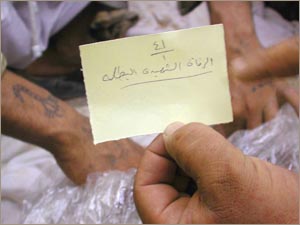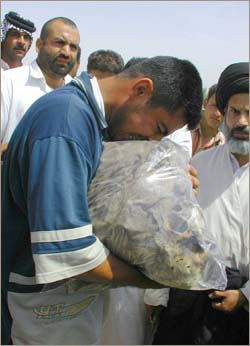 |
 |  |
||||||||||||||
 |
Home | The Sunni Heartland | The Unexpected War | Paying the Price |
||||||||||||||
|
Paying the Price Thirty-five Years of a Brutal Regime A new radio program in Baghdad is trying to reach out to troubled kids. The weekly show is called Shabbab. In English it means young people. The speaker is Dr. Alharith Abdul Hamid Hassan, the director general of the psychological research center at Baghdad University. He says, after thirty-five years of a brutal regime, after three devastating wars in three decades, the trauma runs through generations.
You can see why at this computer center in Baghdad - organized by the free prisoners' committee. They have compiled the recovered records from Iraq's prisons, creating a searchable database. There is a long line of people hoping to discover the fate of family and friends. Abdul Razahd Khabal clutches a small piece of paper - a list of eight names in small Arabic script. The computer operator takes Khabal's list and types in the first name. There is a match. "Executed in 1981." All eight names are in the database, and with each confirmation, more tears roll down Abdul Razahd's face. "Eight of the family were executed. I have 14 person who is missing from my family and I'm looking for that." Abdul Razahd says he is a Shia Muslim. In 1981, a neighbor turned his relatives in to Saddam's security service for performing a religious ritual at home. Shia religious expression was often interpreted by the regime as political opposition - and brutally punished. "Now they are telling me that eight of them were executed because they did that ritual." At the time, Abdul Razahd remained silent. He was a brigadier in the army. To associate himself with political prisoners would have ended his career, ruined his immediate family.
"Quite a lot, I can't give you statistics, if you like, but in my opinion quite, quite a lot," says Hassan. Now, with power outages, water shortages, mass unemployment and overwhelming fears for personal safety, he sees more patients than ever before, with different symptoms, but common concerns. "He's worried about himself," continues Hassan, "he's worried about his wife, he's worried about his daughter, whatever, the one who comes. So they are looking eagerly for safety...They need now safety and security, even before basic needs. "There is a sense of hopelessness and helplessness because of what had happened. Our people were suppressed for decades and here comes the chance to relive the suppression. And I'm sorry to say, sudden release of the pressure has resulted in a disaster. "We have to rebuild again. And I don't know how that is going to take place." Next: Reassessing the Cost |
|||||||||||||||

